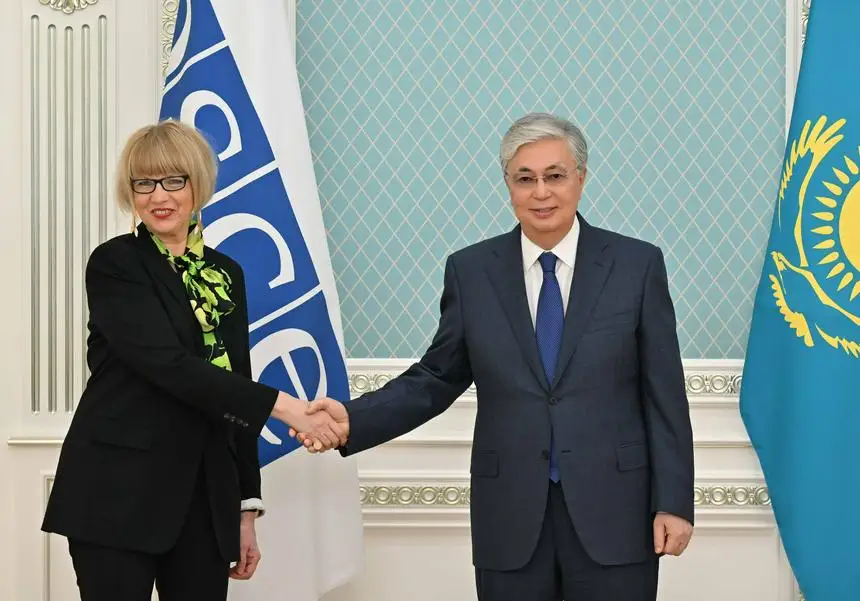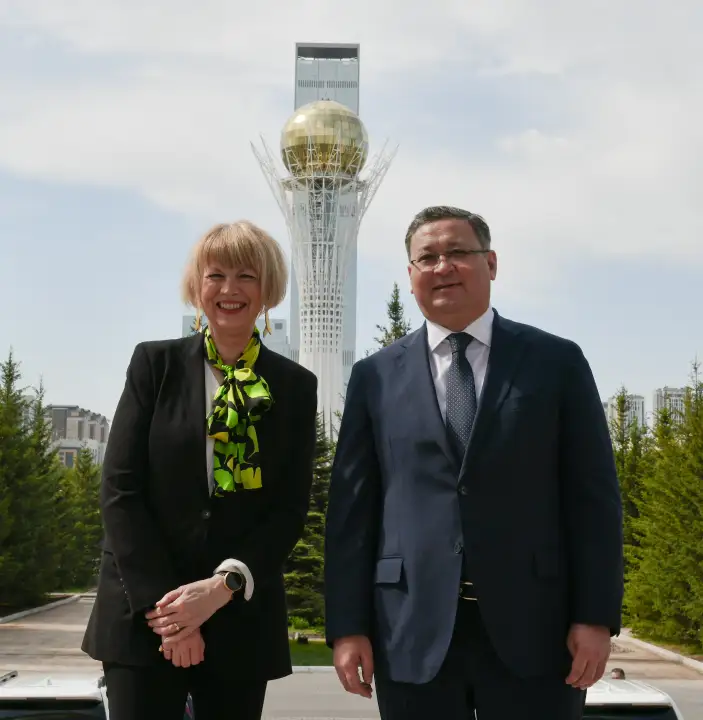OSCE Secretary-General: Kazakhstan is a key actor in regional security, economic prosperity

Could you tell us about the goals of your recent visit to Kazakhstan? What specific areas of cooperation have been discussed with Kazakhstan’s officials and civil society organizations?
I had the honor to speak at the plenary session of the Astana International Forum - and allow me to take the opportunity to commend President Tokayev for giving the forum this new focus on international affairs. This was a timely event and an important platform promoting dialogue and cooperation as a means to tackle key global challenges – which is very much in line with what we do at the OSCE.
During my visit, I also met with President Tokayev, Deputy Prime Minister - Foreign Minister Nurtleu and other government officials. Many of the discussions I had focused on deepening regional cooperation and connectivity in light of shared challenges in the region, such as border management, energy security or climate change. Because what all these challenges have in common is that only a joint and comprehensive response can help to overcome them.

Climate change is a particular threat that requires immediate attention. I am pleased that the President nominated the Minister of Ecology to represent Kazakhstan at the Climate Conference that I will host in Vienna on July 7. The conference will bring together ministers from Central Asia, Europe and the whole OSCE region.
I also had the honor of handing over the international Eco-Port Certificate for the Port of Kuryk to Minister of Ecology Suleimenova. This globally approved standard for environmental management shows how trade and environmental protection can go hand in hand. The certification is the result of successful cooperation between the OSCE and Kazakhstan, of which I am very proud.
Kazakhstan has been an active member of the OSCE since its independence, culminating in its hosting of the 2010 OSCE summit and the adoption of the Astana Declaration. How do you assess Kazakhstan's contribution to the organization's initiatives, and what role does it play in advancing regional stability?
These are important milestones that highlight the longstanding relationship between the OSCE and Kazakhstan, which has deepened considerably since the OSCE Programme Office in Astana was established in 1999.
Since then, Kazakhstan's contribution to the OSCE has played a crucial role in advancing regional stability. As you have mentioned, this was exemplified by the successful 2010 chairmanship, the Astana Summit, and the Astana Declaration, which remains an important document to this day.
Similarly, the OSCE remains firmly committed to Kazakhstan. The staff of our Programme Office in Astana demonstrate this every day by strengthening ties with government, civil society, academia, the private sector and the international community to support the country in its comprehensive reform agenda.
This is particularly important given the unprecedented security risks we face today across the OSCE region, including the impact of the war against Ukraine and the risks stemming from instability in Afghanistan. These are challenges we all face but are acutely felt here in Central Asia.
The most effective way to address these is through regional cooperation. And to this end, Kazakhstan is playing a leading role in the region, as was demonstrated by the impressive Astana International Forum that brought together leaders from around the world.
The OSCE has been regularly sending its observers to monitor the elections in Kazakhstan – early presidential elections in November 2022 and early parliamentary elections in March 2023. How would you evaluate these electoral processes, and how do they shape the political landscape and future in Kazakhstan?
Democratic elections are an important pillar of long-term security and stability. All OSCE participating states have committed to conducting elections in accordance with OSCE and other international standards.
At the invitation of its participating states, the OSCE – or, more precisely, our Office for Democratic Institutions and Human Rights (ODIHR) - observes elections and provides recommendations on how to improve the process. We don’t just look at the voting process itself, but also if political parties had equal access to media or if certain groups face more difficulties when running for office.
While the situation varies from country to country, room for improvement can be found in all OSCE participating states. As the OSCE, we strive to address any shortcomings – as does our Programme Office in Astana, in close cooperation with Kazakhstan’s authorities, following up on the recommendations by ODIHR.
How can the OSCE support the country's continued democratic transition and good governance?
Sustainable democratic development requires strong institutions, respect for the rule of law, and an engaged civil society. In my meetings with representatives from government and parliament, they informed me of their ambitious reform agenda, and I reassured them that the OSCE – both in Vienna, with our institutions and the Programme Office in Astana - stands ready to support.
The OSCE, through our local field staff, is already cooperating closely with Kazakhstan’s officials in this area: to help develop institutional capacities through the Office of the Ombudsperson to promote water resource management or to encourage public participation in government planning and lawmaking.
This cooperation also includes civil society organizations, which play an essential role in protecting human rights, fundamental freedoms and promoting OSCE commitments.

I also met civil society representatives – like always when I travel. We discussed the importance of safeguarding democratic elections and media freedom, and they briefed me about the challenges they currently observe. We also discussed the digital rights of citizens, a critical topic in most countries today – and the risks posed when private companies have access to citizens’ data – be it through our phones or the use of facial recognition technology.
Gender equality and women's empowerment are important aspects of the OSCE's work. What initiatives and programs are being implemented to promote women's participation, including in Kazakhstan?
Gender equality and women's empowerment are fundamental pillars of the OSCE's work and issues that are close to my heart. I recently launched the Women’s Peace Leadership Programme and the Young Women for Peace Initiative as part of our commitment to promoting the role of women in international security.
As the OSCE, we have committed to promoting the full and equal participation of women in all aspects of society. To this end, we have implemented various initiatives and programs to support women's engagement in political and public life, economic empowerment, and the prevention of gender-based violence. We have, for example, a project supporting women working in the energy sector in Central Asia – a sector that is very much dominated by men.
Here, in Astana, our Programme Office, together with the Fund for the Development of Parliamentarism in Kazakhstan, offers courses on the political, social and economic empowerment of women. I am very proud that two of the participants have gone to successfully participate in the 2023 local elections.
And we will continue to work closely with Kazakhstan to promote gender equality and women's rights and to foster an environment where everyone can contribute to the development and well-being of society.
As the Secretary-General, what are your expectations for the OSCE-Kazakhstan partnership, and how can it further contribute to regional stability and cooperation in Central Asia?
Kazakhstan's commitment and experience in promoting regional integration definitely make it stand out in the region. Kazakhstan is one of the key actors in regional security, economic prosperity and human development.
This is evident in our partnership. I commend Kazakhstan’s constructive engagement and close cooperation with the OSCE Secretariat and Institutions. Together, we are strengthening border security management and countering transnational threats, including cybercrime, as well as tackling global challenges with strong regional implications, such as climate change.
How would you describe the challenges that the OSCE is facing today, and to what extent will security mechanisms in Europe change in the future?
The OSCE was created as a platform for dialogue between states that normally do not see eye to eye. I firmly believe that the existence of inclusive platforms, such as the OSCE, where disagreements can be openly discussed, will remain indispensable.
We face a broad range of security challenges, and we know that these don’t stop at any particular border – security is inextricably linked to that of neighboring regions, and it remains crucial to maintain and strengthen our commitment to dialogue, confidence-building, and cooperation among all participating states.